Economic Justice Main Sources: — Mac. Kinnon, Chapter


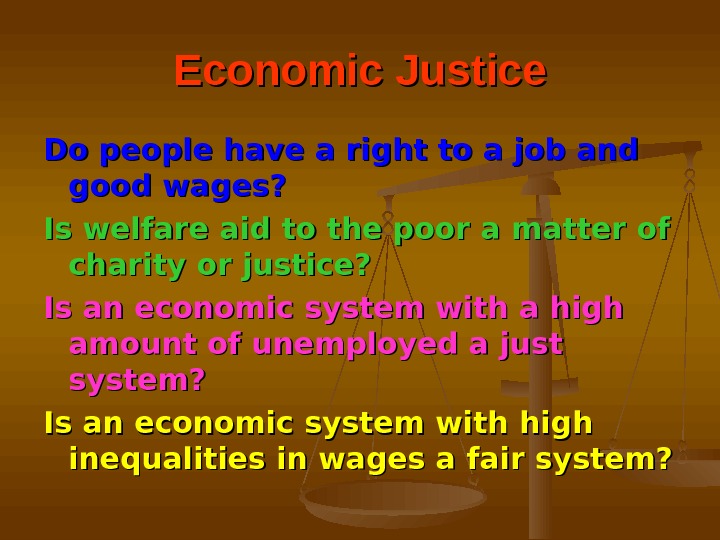


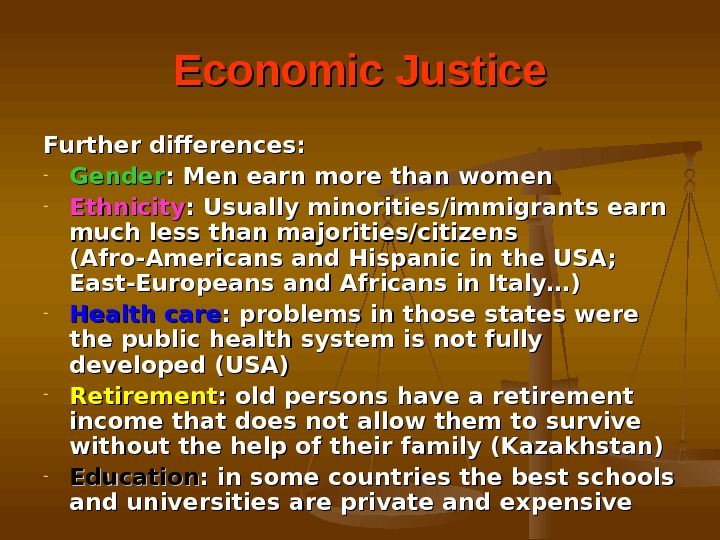
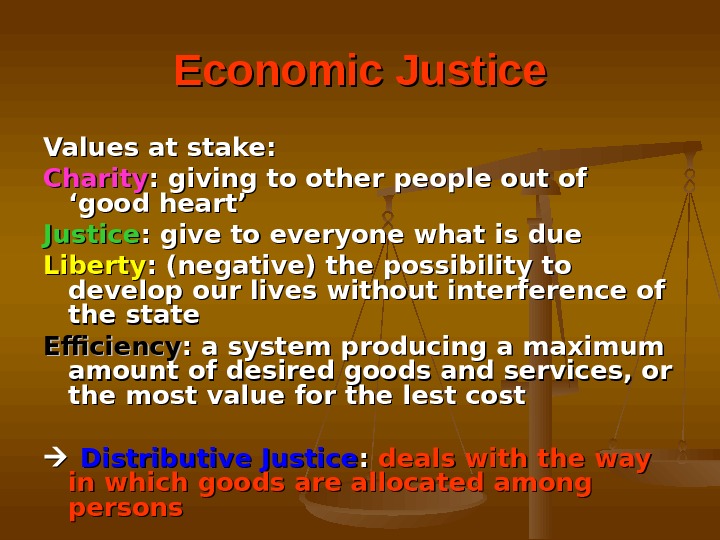

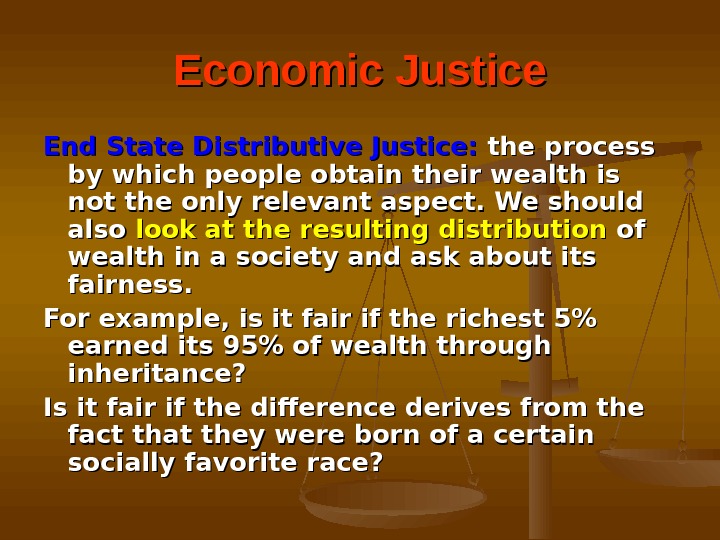
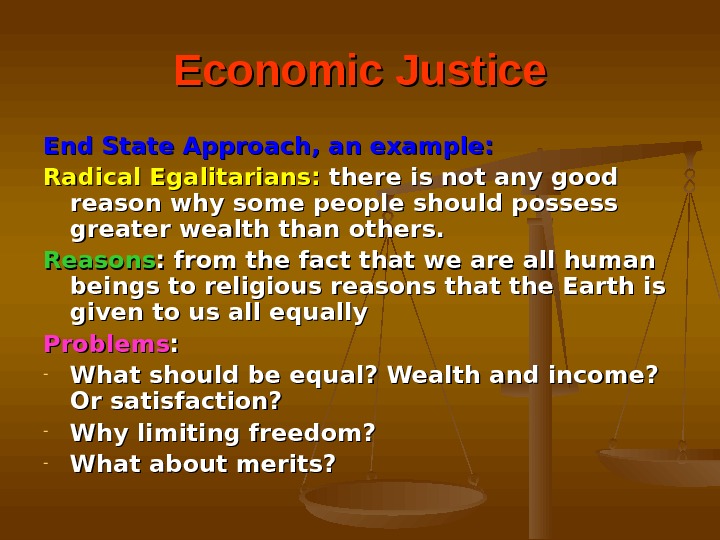

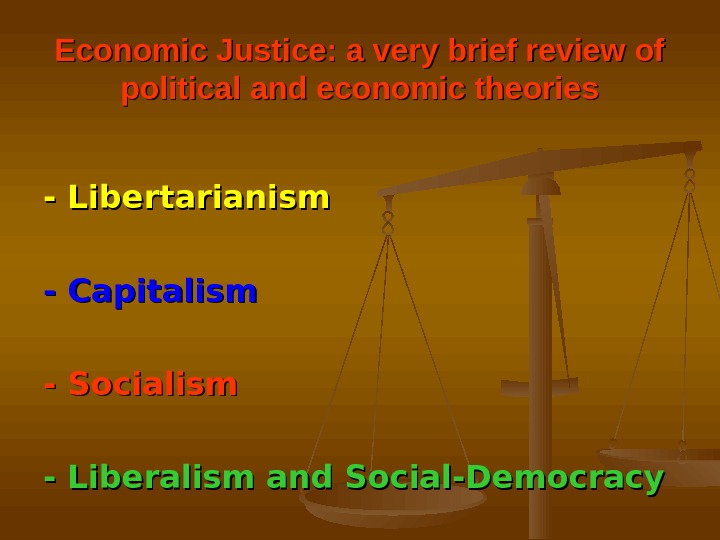
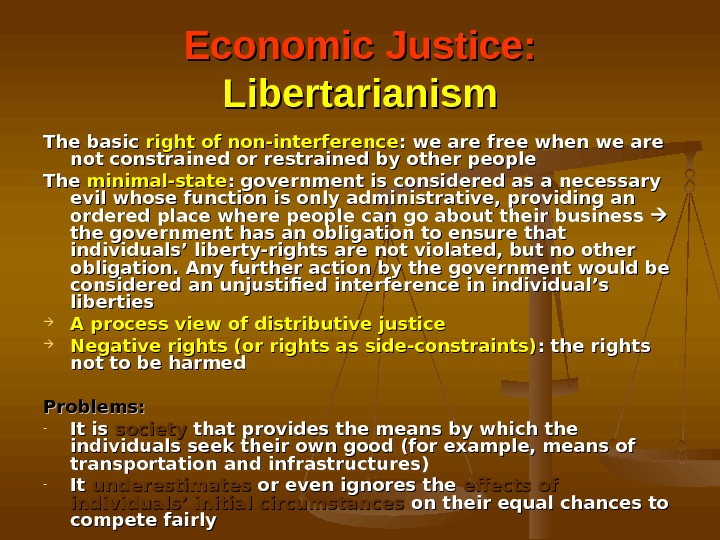
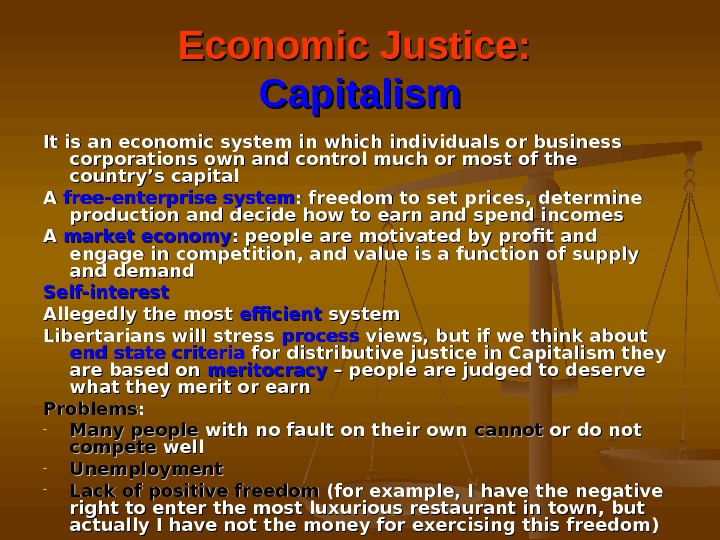


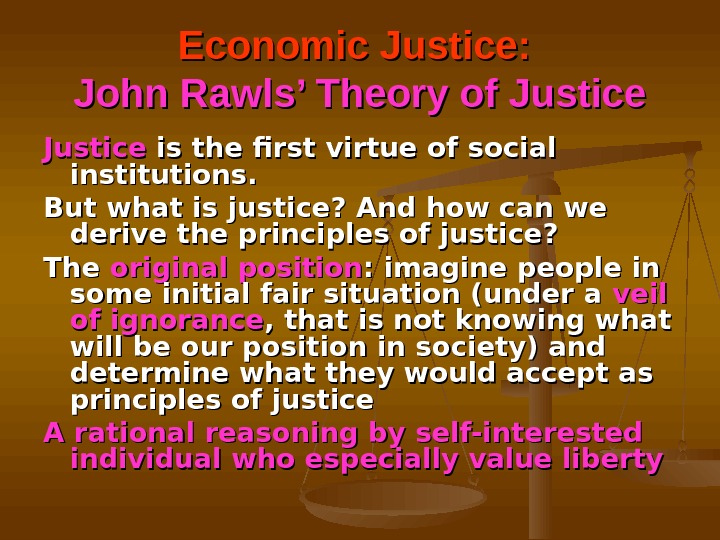

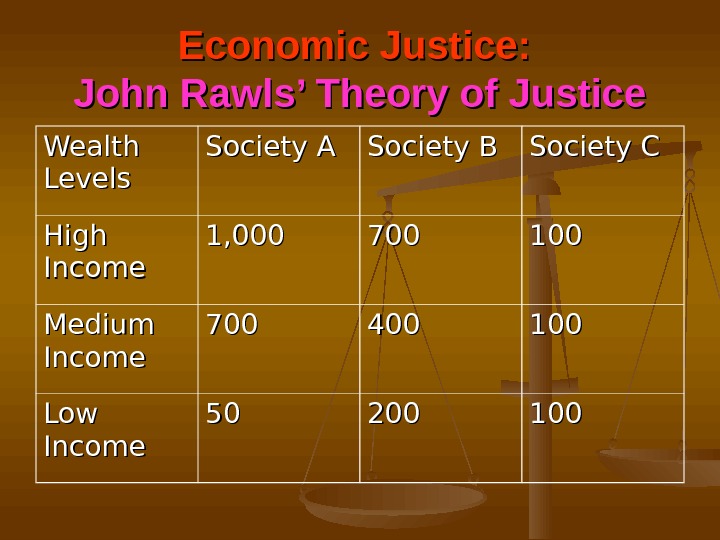


- Размер: 117.5 Кб
- Количество слайдов: 20
Описание презентации Economic Justice Main Sources: — Mac. Kinnon, Chapter по слайдам
 Economic Justice Main Sources: — Mac. Kinnon, Chapter 13 — SEP, Distributive Justice — Hinman, University of San Diego
Economic Justice Main Sources: — Mac. Kinnon, Chapter 13 — SEP, Distributive Justice — Hinman, University of San Diego
 Economic Justice Do people have a right to a job and good wages? Is welfare aid to the poor a matter of charity or justice? Is an economic system with a high amount of unemployed a just system? Is an economic system with high inequalities in wages a fair system?
Economic Justice Do people have a right to a job and good wages? Is welfare aid to the poor a matter of charity or justice? Is an economic system with a high amount of unemployed a just system? Is an economic system with high inequalities in wages a fair system?
 Economic Justice ““ Income inequality is where the capitalist system is most vulnerable. You can’t have the capitalist system if an increasing number of people think it is unjust ”” Alan Greenspan (former chair of FED) 2007 It is a bit difficult to think about a radical alternative to capitalism after the collapse of the Soviet Union, but maybe some corrections are required. But are really people thinking it is an unjust system? Or do they like it? Or is the famous Marxist concept about ‘false class-consciousness’ valid? And, even if you think that the system is unjust, how is it possible to change it? Does not it look so solid and unchangeable that anything you can do is not going to work anyway? How would you involve other persons? And, other than simply complaining, what is the alternative?
Economic Justice ““ Income inequality is where the capitalist system is most vulnerable. You can’t have the capitalist system if an increasing number of people think it is unjust ”” Alan Greenspan (former chair of FED) 2007 It is a bit difficult to think about a radical alternative to capitalism after the collapse of the Soviet Union, but maybe some corrections are required. But are really people thinking it is an unjust system? Or do they like it? Or is the famous Marxist concept about ‘false class-consciousness’ valid? And, even if you think that the system is unjust, how is it possible to change it? Does not it look so solid and unchangeable that anything you can do is not going to work anyway? How would you involve other persons? And, other than simply complaining, what is the alternative?
 Economic Justice The income gap : the richest part of the population earns a disproportionate amount of money compared to the poorest part And the difference is widening: In 1894 industrialist John D. Rockefeller’s income was $1. 25 million 7, 000 times the average national (USA) income In 2006 hedge-fund manager James Simon’s income was $ 1. 7 billion 38, 000 times the average national (USA) income In 1980 corporate executive of large companies in the USA earned 45 times more than nonsupervisory workers In 2000 corporate executive of large companies in the USA earned 458 times more than ordinary workers
Economic Justice The income gap : the richest part of the population earns a disproportionate amount of money compared to the poorest part And the difference is widening: In 1894 industrialist John D. Rockefeller’s income was $1. 25 million 7, 000 times the average national (USA) income In 2006 hedge-fund manager James Simon’s income was $ 1. 7 billion 38, 000 times the average national (USA) income In 1980 corporate executive of large companies in the USA earned 45 times more than nonsupervisory workers In 2000 corporate executive of large companies in the USA earned 458 times more than ordinary workers
 Economic Justice Further differences: — Gender : Men earn more than women — Ethnicity : Usually minorities/immigrants earn much less than majorities/citizens (Afro-Americans and Hispanic in the USA; East-Europeans and Africans in Italy…) — Health care : problems in those states were the public health system is not fully developed (USA) — Retirement : old persons have a retirement income that does not allow them to survive without the help of their family (Kazakhstan) — Education : in some countries the best schools and universities are private and expensive
Economic Justice Further differences: — Gender : Men earn more than women — Ethnicity : Usually minorities/immigrants earn much less than majorities/citizens (Afro-Americans and Hispanic in the USA; East-Europeans and Africans in Italy…) — Health care : problems in those states were the public health system is not fully developed (USA) — Retirement : old persons have a retirement income that does not allow them to survive without the help of their family (Kazakhstan) — Education : in some countries the best schools and universities are private and expensive
 Economic Justice Values at stake: Charity : giving to other people out of ‘good heart’ Justice : give to everyone what is due Liberty : (negative) the possibility to develop our lives without interference of the state Efficiency : a system producing a maximum amount of desired goods and services, or the most value for the lest cost Distributive Justice : : deals with the way in which goods are allocated among persons
Economic Justice Values at stake: Charity : giving to other people out of ‘good heart’ Justice : give to everyone what is due Liberty : (negative) the possibility to develop our lives without interference of the state Efficiency : a system producing a maximum amount of desired goods and services, or the most value for the lest cost Distributive Justice : : deals with the way in which goods are allocated among persons
 Economic Justice Process Distributive Justice (or Procedural Justice): any economic distribution is just if the process by by which it comes about is itself just For example, if the wealthiest 5% of the people got their 90% of the wealth fairly – they competed for jobs, they were honest, they did not take what was not theirs – then what they earned would be rightly theirs.
Economic Justice Process Distributive Justice (or Procedural Justice): any economic distribution is just if the process by by which it comes about is itself just For example, if the wealthiest 5% of the people got their 90% of the wealth fairly – they competed for jobs, they were honest, they did not take what was not theirs – then what they earned would be rightly theirs.
 Economic Justice End State Distributive Justice: the process by which people obtain their wealth is not the only relevant aspect. We should also look at the resulting distribution of of wealth in a society and ask about its fairness. For example, is it fair if the richest 5% earned its 95% of wealth through inheritance? Is it fair if the difference derives from the fact that they were born of a certain socially favorite race?
Economic Justice End State Distributive Justice: the process by which people obtain their wealth is not the only relevant aspect. We should also look at the resulting distribution of of wealth in a society and ask about its fairness. For example, is it fair if the richest 5% earned its 95% of wealth through inheritance? Is it fair if the difference derives from the fact that they were born of a certain socially favorite race?
 Economic Justice End State Approach, an example: Radical Egalitarians: there is not any good reason why some people should possess greater wealth than others. Reasons : from the fact that we are all human beings to religious reasons that the Earth is given to us all equally Problems : : — What should be equal? Wealth and income? Or satisfaction? — Why limiting freedom? — What about merits?
Economic Justice End State Approach, an example: Radical Egalitarians: there is not any good reason why some people should possess greater wealth than others. Reasons : from the fact that we are all human beings to religious reasons that the Earth is given to us all equally Problems : : — What should be equal? Wealth and income? Or satisfaction? — Why limiting freedom? — What about merits?
 Economic Justice Equal Opportunity: an unequal distribution of wealth in a society is just whether people have a fair chance to attain those positions of greater income or wealth. Equality of wealth is not required, only the equal opportunity to attain it. — No barriers preventing people, or if there are barriers they affect everyone (for example, if women have twice the family responsibility as men, do they have equal opportunities to compete professionally? ) — Educational, motivational and experiential advantages in being born in a wealthy family — Problems : : — Wrong focus : it is not important that the billionaire earns more money, but that people have what they need so they can do what they want in life — Natural aristocracy instead of social: this theory implies equal rewards for equal performance, but its notion of meritocracy is wrong. The idea of a market place competition threatens the notion of human solidarity
Economic Justice Equal Opportunity: an unequal distribution of wealth in a society is just whether people have a fair chance to attain those positions of greater income or wealth. Equality of wealth is not required, only the equal opportunity to attain it. — No barriers preventing people, or if there are barriers they affect everyone (for example, if women have twice the family responsibility as men, do they have equal opportunities to compete professionally? ) — Educational, motivational and experiential advantages in being born in a wealthy family — Problems : : — Wrong focus : it is not important that the billionaire earns more money, but that people have what they need so they can do what they want in life — Natural aristocracy instead of social: this theory implies equal rewards for equal performance, but its notion of meritocracy is wrong. The idea of a market place competition threatens the notion of human solidarity
 Economic Justice: a very brief review of political and economic theories — Libertarianism — Capitalism — Socialism — Liberalism and Social-Democracy
Economic Justice: a very brief review of political and economic theories — Libertarianism — Capitalism — Socialism — Liberalism and Social-Democracy
 Economic Justice: Libertarianism The basic right of non-interference : we are free when we are not constrained or restrained by other people The minimal-state : government is considered as a necessary evil whose function is only administrative, providing an ordered place where people can go about their business the government has an obligation to ensure that individuals’ liberty-rights are not violated, but no other obligation. Any further action by the government would be considered an unjustified interference in individual’s liberties A process view of distributive justice Negative rights (or rights as side-constraints) : the rights not to be harmed Problems: — It is society that provides the means by which the individuals seek their own good (for example, means of transportation and infrastructures) — It It underestimates or even ignores the effects of individuals’ initial circumstances on their equal chances to compete fairly
Economic Justice: Libertarianism The basic right of non-interference : we are free when we are not constrained or restrained by other people The minimal-state : government is considered as a necessary evil whose function is only administrative, providing an ordered place where people can go about their business the government has an obligation to ensure that individuals’ liberty-rights are not violated, but no other obligation. Any further action by the government would be considered an unjustified interference in individual’s liberties A process view of distributive justice Negative rights (or rights as side-constraints) : the rights not to be harmed Problems: — It is society that provides the means by which the individuals seek their own good (for example, means of transportation and infrastructures) — It It underestimates or even ignores the effects of individuals’ initial circumstances on their equal chances to compete fairly
 Economic Justice: Capitalism It is an economic system in which individuals or business corporations own and control much or most of the country’s capital A A free-enterprise system : freedom to set prices, determine production and decide how to earn and spend incomes A A market economy : people are motivated by profit and engage in competition, and value is a function of supply and demand Self-interest Allegedly the most efficient system Libertarians will stress process views, but if we think about end state criteria for distributive justice in Capitalism they are based on meritocracy – people are judged to deserve what they merit or earn Problems : : — Many people with no fault on their own cannot or do not compete well — Unemployment — Lack of positive freedom (for example, I have the negative right to enter the most luxurious restaurant in town, but actually I have not the money for exercising this freedom)
Economic Justice: Capitalism It is an economic system in which individuals or business corporations own and control much or most of the country’s capital A A free-enterprise system : freedom to set prices, determine production and decide how to earn and spend incomes A A market economy : people are motivated by profit and engage in competition, and value is a function of supply and demand Self-interest Allegedly the most efficient system Libertarians will stress process views, but if we think about end state criteria for distributive justice in Capitalism they are based on meritocracy – people are judged to deserve what they merit or earn Problems : : — Many people with no fault on their own cannot or do not compete well — Unemployment — Lack of positive freedom (for example, I have the negative right to enter the most luxurious restaurant in town, but actually I have not the money for exercising this freedom)
 Economic Justice: Socialism An economic system, a political movement, and a social theory Government should own and control most of a nation’s resources; it should engage in planning and adjust production to the needs of the people Theoretically combining justice and efficiency End state and justice and egalitarian in orientation Government should address constraints to freedom such as the satisfaction of basic needs, poor education and poor health care Positive Rights : for example, not only a right not to be killed, but also a right to what is necessary to live Problems : : — Efficiency — Authoritarianism
Economic Justice: Socialism An economic system, a political movement, and a social theory Government should own and control most of a nation’s resources; it should engage in planning and adjust production to the needs of the people Theoretically combining justice and efficiency End state and justice and egalitarian in orientation Government should address constraints to freedom such as the satisfaction of basic needs, poor education and poor health care Positive Rights : for example, not only a right not to be killed, but also a right to what is necessary to live Problems : : — Efficiency — Authoritarianism
 Economic Justice: Modern Liberalism and Social- Democracy Trying to compose liberty rights with justice The Government should support both Negative and Positive Liberties (though negative liberties are prevalent in a liberal view while positive liberties are prevalent in a social-democratic view) Capitalist system of incentives and wealth inequalities in order to promote efficiency Separation of public and private spaces in order to promote liberties (particular emphasis by liberals )) Public investment in education, health, infrastructures, human development in order to promote distributive and redistributive justice (particular emphasis by social-democrats ) ) Problems : : Depending on the focus (more liberal or more social-democratic) it risks facing the same problems of previous theories, or even combining their problems ( ( though apparently reducing their magnitude ))
Economic Justice: Modern Liberalism and Social- Democracy Trying to compose liberty rights with justice The Government should support both Negative and Positive Liberties (though negative liberties are prevalent in a liberal view while positive liberties are prevalent in a social-democratic view) Capitalist system of incentives and wealth inequalities in order to promote efficiency Separation of public and private spaces in order to promote liberties (particular emphasis by liberals )) Public investment in education, health, infrastructures, human development in order to promote distributive and redistributive justice (particular emphasis by social-democrats ) ) Problems : : Depending on the focus (more liberal or more social-democratic) it risks facing the same problems of previous theories, or even combining their problems ( ( though apparently reducing their magnitude ))
 Economic Justice: John Rawls’ Theory of Justice is the first virtue of social institutions. But what is justice? And how can we derive the principles of justice? The original position : imagine people in some initial fair situation (under a veil of ignorance , that is not knowing what will be our position in society) and determine what they would accept as principles of justice A rational reasoning by self-interested individual who especially value liberty
Economic Justice: John Rawls’ Theory of Justice is the first virtue of social institutions. But what is justice? And how can we derive the principles of justice? The original position : imagine people in some initial fair situation (under a veil of ignorance , that is not knowing what will be our position in society) and determine what they would accept as principles of justice A rational reasoning by self-interested individual who especially value liberty
 Economic Justice: John Rawls’ Theory of Justice The two principles of justice : : 1)1) Each person is to have equal right to the most extensive total system of equal basic liberties compatible with a similar system of liberty for allall 2)2) Social and economic inequalities are to arranged so that they are a)a) Attached to offices and positions open to all under conditions of fair equality of opportunity b)b) To the greatest benefit of the least advantaged Notice. There is a lexicographic order : if 1 and 2 conflict, number 1 has priority
Economic Justice: John Rawls’ Theory of Justice The two principles of justice : : 1)1) Each person is to have equal right to the most extensive total system of equal basic liberties compatible with a similar system of liberty for allall 2)2) Social and economic inequalities are to arranged so that they are a)a) Attached to offices and positions open to all under conditions of fair equality of opportunity b)b) To the greatest benefit of the least advantaged Notice. There is a lexicographic order : if 1 and 2 conflict, number 1 has priority
 Economic Justice: John Rawls’ Theory of Justice Wealth Levels Society A Society B Society C High Income 1, 000 700700 100100 Medium Income 700700 400400 100100 Low Income
Economic Justice: John Rawls’ Theory of Justice Wealth Levels Society A Society B Society C High Income 1, 000 700700 100100 Medium Income 700700 400400 100100 Low Income
 Economic Justice: John Rawls’ Theory of Justice Rawls choice is Society B Maximin Strategy : in choosing under conditions of uncertainty, you choose that option with the best worst or minimum position Principle 1 : the value of liberty Principle 2 a : : equal opportunities in order to preserve individual merits and efficiency Principle 2 b : The Difference Principle Justice as redress of nature or society (our initial conditions should not be influenced by natural and social circumstances). Redistributing, but preserving the incentives related to greater efforts such as earning more income
Economic Justice: John Rawls’ Theory of Justice Rawls choice is Society B Maximin Strategy : in choosing under conditions of uncertainty, you choose that option with the best worst or minimum position Principle 1 : the value of liberty Principle 2 a : : equal opportunities in order to preserve individual merits and efficiency Principle 2 b : The Difference Principle Justice as redress of nature or society (our initial conditions should not be influenced by natural and social circumstances). Redistributing, but preserving the incentives related to greater efforts such as earning more income
 Economic Justice: John Rawls’ Theory of Justice CRITIQUES Strict egalitarians : don’t treat anyone differently Utilitarians : doesn’t maximize utility Libertarian : infringes on liberty through taxation, etc. Desert-based theorists argue to reward hard work even when it doesn’t help the disadvantaged
Economic Justice: John Rawls’ Theory of Justice CRITIQUES Strict egalitarians : don’t treat anyone differently Utilitarians : doesn’t maximize utility Libertarian : infringes on liberty through taxation, etc. Desert-based theorists argue to reward hard work even when it doesn’t help the disadvantaged

